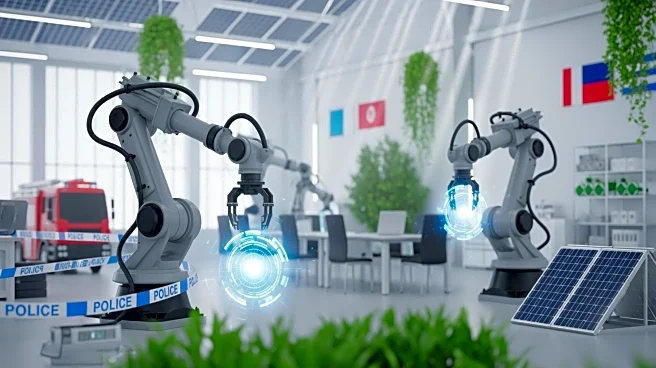What's Happening?
Sage, a prominent player in the manufacturing sector, is actively contributing to the evolution of smart factories by integrating advanced technologies such as AI and ERP systems. Andy Reid, head of Sage’s
ERP Product Marketing, highlighted the company's efforts in enhancing production efficiency and sustainability. Sage's solutions, like Sage X3, have demonstrated significant improvements in productivity, as seen with clients like Majestic Wines, which reported a 50% increase in efficiency. The company is focusing on balancing automation with human involvement, ensuring that technology aids rather than replaces the workforce. Additionally, Sage is addressing regulatory compliance and supply chain challenges by providing tools that enhance traceability and energy management, crucial for meeting ESG goals.
Why It's Important?
The integration of AI and digital tools in manufacturing is crucial for the industry's future, as it addresses key challenges such as supply chain disruptions, regulatory compliance, and sustainability. By adopting these technologies, manufacturers can improve efficiency, reduce waste, and enhance product traceability, which are vital for maintaining competitiveness in a global market. Sage's approach to combining human and technological efforts ensures that the workforce remains central to production, potentially leading to job retention and skill development. This shift towards smart factories not only benefits manufacturers by reducing costs and increasing productivity but also aligns with broader environmental goals by promoting sustainable practices.
What's Next?
As the manufacturing sector continues to evolve, companies like Sage are expected to play a pivotal role in driving digital transformation. The focus will likely remain on enhancing automation while ensuring human involvement, addressing skills shortages, and improving supply chain resilience. Manufacturers may increasingly adopt AI-driven solutions to foresee production issues and optimize operations. The ongoing collaboration between technology providers and manufacturers will be essential in overcoming challenges related to globalization, labor shortages, and the need for efficient digitization. Stakeholders, including government bodies, may need to support these efforts through coordinated innovation and funding to facilitate the industry's transition to more sustainable and technologically advanced practices.
Beyond the Headlines
The shift towards smart factories and digital transformation in manufacturing has deeper implications for the workforce and industry standards. As automation becomes more prevalent, there is a need to address the stigma associated with manufacturing jobs and promote the sector as a hub for innovation and technology. This cultural shift could attract a new generation of workers interested in science and engineering, helping to alleviate the skills shortage. Additionally, the emphasis on sustainability and compliance may lead to stricter regulations and standards, pushing manufacturers to adopt more transparent and environmentally friendly practices. These changes could redefine the manufacturing landscape, making it more resilient and adaptable to future challenges.











